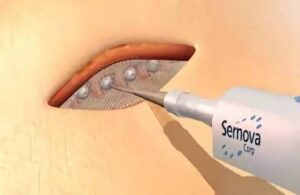
The collaboration aims to evaluate the use of Sernova’s Cell Pouch System in combination with AstraZeneca’s novel therapeutic cells.
London, Ontario-based Sernova designed its proprietary Cell Pouch System as an implantable and scalable medical device. It forms a natural environment in the body for the long-term survival and function of therapeutic cells. Those cells release necessary proteins or factors missing from the body to treat chronic diseases, including insulin-dependent diabetes.
Sernova’s ongoing Phase 1/2 clinical trial evaluates six patients with long-standing, insulin-dependent T1D. Those patients have hypoglycemia unawareness prior to treatment. Sernova announced positive data from that trial in June 2022, which includes three patients achieving insulin independence.
Late last year, the company received approval to proceed with a strategically optimized protocol reducing the time required for patient treatment. It also accelerates potential secondary endpoint efficacy achievement with more optimal dosing.
Read more about Sernova’s goals in this interview with the company’s CEO.
About Sernova and its agreement with AstraZeneca
AstraZeneca aims to use the Sernova Cell Pouch System as a potential platform for integration with its cell therapies. These innovative therapies cover various indications.
Under the terms of the agreement, AstraZeneca will lead and completely fund development of the cell technologies and pre-clinical activities in conjunction with Sernova. Preclinical outcomes may determine the feasibility of potential therapeutic applications. If feasible, it could lead to subsequent product development activities between the two companies.
“Sernova has developed a novel cell therapy approach for the potential treatment of insulin-dependent diabetes, hypothyroidism and hemophilia A,” said Dr. Philip Toleikis, president and CEO of Sernova. “By engrafting functional therapeutic cells within an implanted Cell Pouch, which naturally vascularizes with surrounding tissues, we create an environment for the production and release of absent or under-expressed hormones and proteins.
“We are pleased to be working with AstraZeneca in the preclinical assessment of its various proprietary therapeutic cells in combination with our Cell Pouch.”

